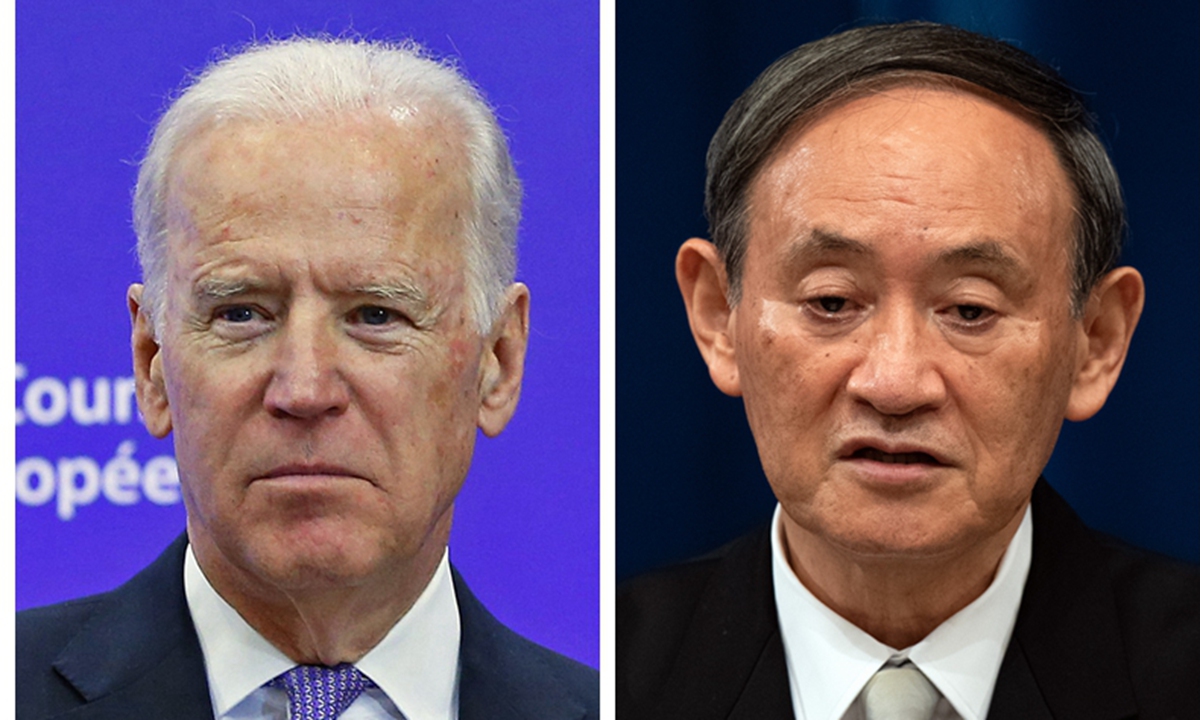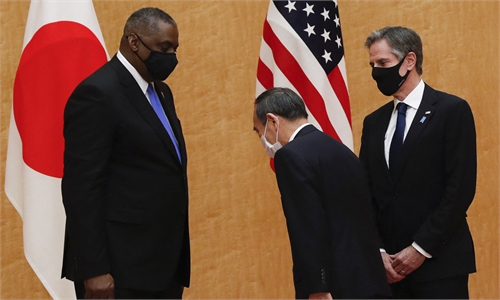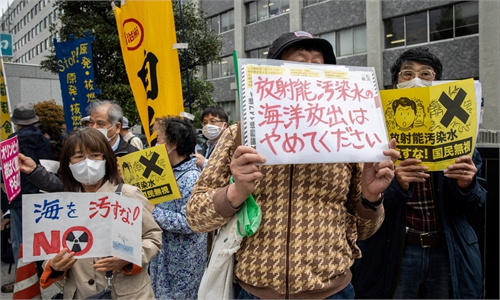
Combo photo shows U.S. President Joe Biden (L) and Japanese Prime Minister Yoshihide Suga on different occasions. (Xinhua)
Japanese Prime Minister Yoshihide Suga is scheduled to meet with US President Joe Biden on Friday. According to Japanese media, the two leaders plan to affirm the importance of stability in the Taiwan Straits in a joint statement after the summit. Government sources also told the media that Japan and the US have agreed to closely cooperate in the event of a military clash between the mainland and Taiwan.In a tweet on Wednesday, Japanese State Minister of Defense, Yasuhide Nakayama, said that as the US sent former senior State Department officials, like Richard Armitage, to Taiwan and decided to ease contact restrictions with the island, the Japanese government should carefully examine the same content and consider the same policy to be implemented as soon as possible.
But such statement is meaningless. In 2017, then vice minister of Internal Affairs and Communications, Jiro Akama, visited Taiwan to attend a Japanese culture and tourism promotion event, making him the most senior government official to visit the island since "diplomatic" ties were severed with Taiwan in 1972. Shinzo Abe also visited Taiwan in 2010 as former prime minister. The fact that Japanese politicians visit Taiwan is not a new thing and they more or less have the support from the National Diet.
Japan has been playing the Taiwan card for a long time. The rhetoric by the state minister of defense at this time signals Japan's interest in deepening its security cooperation with Taiwan island to exploit potential advantages.
The Taiwan Straits is an important passage for international trade. It is particularly vital for the export-oriented economy of Japan. Therefore, peace and stability is critical for Japan's economic interests. If the mainland and Taiwan are reunified, Japan would feel a strong sense of economic insecurity.
With the meddling of the US and Japan, the Taiwan question has remained unsolved and has become an issue that not only matters the mainland and Taiwan, but also impacts security and stability of the Asia-Pacific. Taiwan is positioned at the center of the so-called first island chain. If the mainland and Taiwan are reunified, it means China's national defense frontline will move forward a few hundred kilometers and the first island chain will no longer exist. This will change geopolitical pattern of the region.
The US-Japan alliance has been in shape since the end of the Second World War. Japan will rely on the US for security. After the war, the fundamental and systematic change in world politics has been China's rise. The US definition of China is clear, as mentioned by former US president Donald Trump, where China is labeled as a "revisionist" power that challenged the US-led international liberal order. Now, Biden describes China as the "most serious competitor." Meanwhile, Japan places itself as a developed Western country and beneficiary of the US-led liberal order. Therefore, it also considers China to be a challenging actor. In a nutshell, Japan will follow the US in its China policy.
With Sino-US relations at low point, Sino-Japan relations are not expected to be in the best of term. In addition, Suga, whose ruling foundation is loose, faces a general election later this year and the criticism for his failure to handle the COVID-19 pandemic. Therefore, he has to echo the hawks within Japan to utter strong words against China and seek more security commitment from the US.
Meanwhile, the US is playing a double game on key issues of Japan's concern. The US affirms that the US-Japan Security Treaty applies to the Diaoyu Islands and conducts joint drills with Japan for defense of these islands, in a bid to strengthen security cooperation with Japan. But the US refuses to admit Tokyo's sovereignty claims over the Diaoyu. In late February, Pentagon Press Secretary John Kirby said the US supports Tokyo's sovereignty claims, but he quickly corrected his "error" and apologized for the confusion.
The US' two-faced strategy shows the divergent interests between the US and Japan. The US worries that if it offers generous support to Japan, Tokyo might deliberately provoke Beijing and start a conflict with China. If that happens, the US would be dragged into a conflict it does not desire. This would run contrary to American interests. The US-Japan alliance looks solid, but their self-interests drift apart and this is something both parties know.
The author is a senior research fellow at Center for Asia-Pacific Studies, the Institute for Foreign Policy Studies under the Shanghai Institutes for International Studies. opinion@globaltimes.com.cn


